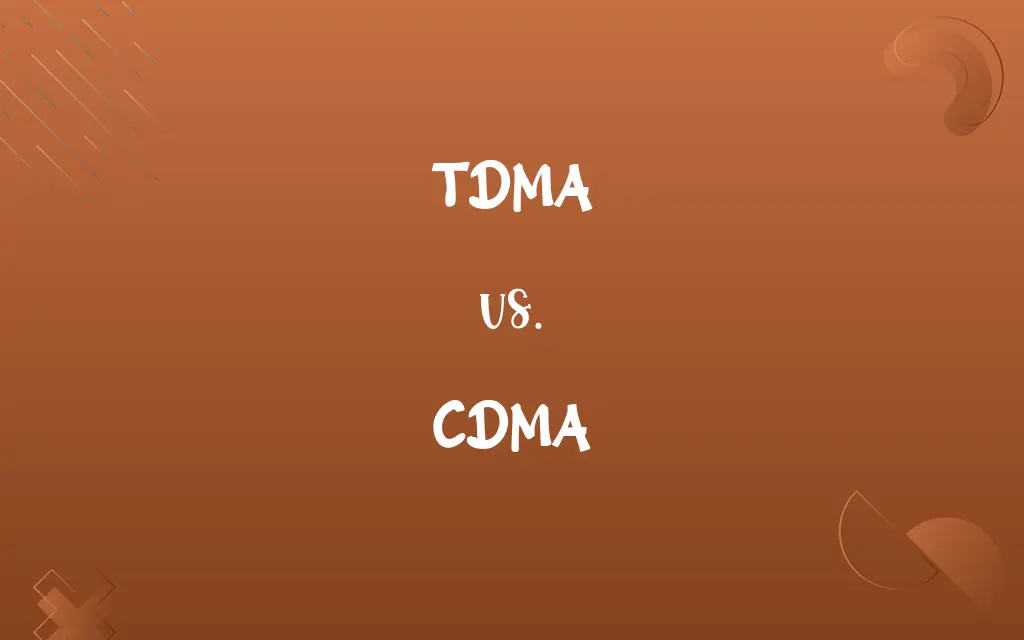TDMA vs. CDMA: Know the Difference

By Shumaila Saeed & Hifza Nasir || Published on March 7, 2024
TDMA assigns time slots to multiple users within the same frequency band, whereas CDMA spreads each user's signal across the entire available bandwidth using unique codes.

Key Differences
TDMA (Time Division Multiple Access) divides the frequency band into time slots, allowing users to share the frequency but transmit one at a time in rapid succession. This method effectively increases the capacity by utilizing the time dimension, with each user having exclusive access to the channel during their assigned slot. In contrast, CDMA (Code Division Multiple Access) allows all users to occupy the same frequency band simultaneously but differentiates them using unique codes. Each user's signal is spread over the entire bandwidth, and by correlating the received signal with the known code, the receiver can isolate the intended signal from the others.
Hifza Nasir
Mar 07, 2024
TDMA structures access by time, leading to a sequential sharing mechanism, CDMA employs spread-spectrum technology, enhancing privacy and resistance to interference. This fundamental difference in approach allows CDMA to better handle more users and variations in signal strength, making it well-suited for large networks and areas with significant obstacles or interference.
Shumaila Saeed
Mar 07, 2024
TDMA's efficiency is closely tied to its ability to manage the allocated time slots effectively, requiring precise synchronization among users. This can limit its capacity and flexibility in dynamic environments. CDMA, with its code-based separation, inherently offers better capacity for handling simultaneous transmissions, providing a more robust solution in environments with fluctuating network demands.
Shumaila Saeed
Mar 07, 2024
The application of TDMA is seen in systems where predictable and structured access is necessary, such as in early digital mobile phone technologies (e.g., GSM). CDMA, on the other hand, is utilized in contexts requiring high capacity and flexibility, notable in many cellular networks (e.g., 3G networks) due to its superior handling of simultaneous data transmissions and its scalability.
Hifza Nasir
Mar 07, 2024
Choosing between TDMA and CDMA involves considering factors like network size, user density, and the specific requirements for data transmission and interference resistance. While TDMA offers a simpler and more cost-effective solution for smaller, less dynamic settings, CDMA's complexity and cost are justified by its performance in larger, more demanding environments.
Hifza Nasir
Mar 07, 2024
ADVERTISEMENT
Comparison Chart
Access Method
Time-based division of frequency band
Code-based sharing of the same frequency band
Hifza Nasir
Mar 07, 2024
Interference
More susceptible to timing issues
Better resistance to interference
Shumaila Saeed
Mar 07, 2024
ADVERTISEMENT
Capacity
Limited by the number of time slots
Higher user capacity due to spread-spectrum
Dua Fatima
Mar 07, 2024
Implementation Complexity
Lower compared to CDMA
Higher due to coding and decoding processes
Dua Fatima
Mar 07, 2024
Typical Applications
Early digital cellular, certain satellite communications
Modern cellular networks, GPS, 3G networks
Hifza Nasir
Mar 07, 2024
TDMA and CDMA Definitions
TDMA
Shares frequency by dividing into time slots.
In GSM, each channel is divided into eight time slots.
Hifza Nasir
Feb 26, 2024
CDMA
Offers enhanced privacy and interference resistance.
Signals are more difficult to intercept or jam.
Shumaila Saeed
Feb 26, 2024
ADVERTISEMENT
TDMA
Requires tight synchronization.
Each user must transmit within their precise time slot.
Shumaila Saeed
Feb 26, 2024
CDMA
Spreads signal across the entire bandwidth.
A user's signal is intermixed over the available spectrum.
Shumaila Saeed
Feb 26, 2024
TDMA
Limited by slot availability.
Can only support a certain number of users per frequency band.
Shumaila Saeed
Feb 26, 2024
CDMA
Flexible and scalable for dynamic user numbers.
Efficiently accommodates varying numbers of simultaneous users.
Hifza Nasir
Feb 26, 2024
TDMA
Enables sequential access for users.
Users transmit in rapid succession, one at a time.
Shumaila Saeed
Feb 26, 2024
CDMA
Allows simultaneous frequency use with unique codes.
Each user's data is encoded with a distinct code.
Hifza Nasir
Feb 26, 2024
TDMA
Suited for structured, predictable environments.
Fixed satellite communication systems.
Shumaila Saeed
Feb 26, 2024
CDMA
Requires complex decoding.
Receivers must decipher the intended signal from the combined spectrum.
Hifza Nasir
Feb 26, 2024
Repeatedly Asked Queries
Can TDMA and CDMA be used in the same network?
While TDMA and CDMA are fundamentally different, hybrid systems can utilize both technologies in different parts of the network to optimize capacity and performance.
Hifza Nasir
Mar 07, 2024
Why might a network choose TDMA over CDMA?
A network might choose TDMA for its simpler implementation, lower cost, and adequacy for environments with predictable, low-density traffic.
Dua Fatima
Mar 07, 2024
What are the limitations of TDMA?
TDMA's limitations include a fixed capacity defined by time slots, susceptibility to timing issues, and potential inefficiencies in dynamic or dense user environments.
Dua Fatima
Mar 07, 2024
What is CDMA?
CDMA is a spread-spectrum technology that allows multiple users to occupy the same frequency band simultaneously by assigning unique codes to each user's signal.
Shumaila Saeed
Mar 07, 2024
Which technology offers better security, TDMA or CDMA?
CDMA offers better security due to its spread-spectrum technique, which makes it harder for unintended receivers to intercept or decipher the communication.
Shumaila Saeed
Mar 07, 2024
How do TDMA and CDMA differ in user handling?
TDMA assigns specific time slots to users for sequential access, while CDMA spreads each user's signal across the entire bandwidth using unique codes for simultaneous access.
Shumaila Saeed
Mar 07, 2024
Why is CDMA considered more resistant to interference?
CDMA's spread-spectrum approach makes it inherently more resistant to interference and signal degradation, as the unique codes allow for effective signal isolation and recovery.
Shumaila Saeed
Mar 07, 2024
How do TDMA and CDMA impact battery life?
CDMA generally requires more complex signal processing, which can increase power consumption compared to TDMA's simpler time-slot approach, potentially affecting battery life.
Dua Fatima
Mar 07, 2024
How do advancements in technology affect the use of TDMA and CDMA?
Technological advancements continue to influence the efficiency, capacity, and applicability of both TDMA and CDMA, with ongoing improvements in signal processing, coding, and spectrum management.
Shumaila Saeed
Mar 07, 2024
Can TDMA and CDMA coexist with newer technologies like LTE?
Yes, both can coexist and complement newer technologies like LTE, which uses a different access method (OFDMA for downlink and SC-FDMA for uplink) but can integrate with legacy systems.
Dua Fatima
Mar 07, 2024
What is TDMA?
TDMA is a technology that divides a frequency band into multiple time slots to allow several users to share the same frequency without interference by transmitting in sequence.
Hifza Nasir
Mar 07, 2024
Is CDMA more complex to implement than TDMA?
Yes, CDMA's use of unique codes for each user and the need for complex decoding algorithms make it more complex and costly to implement than TDMA.
Dua Fatima
Mar 07, 2024
How does CDMA handle more users efficiently?
CDMA's efficiency comes from its ability to use the entire bandwidth for each user through coding, allowing for higher capacity and flexibility in handling simultaneous transmissions.
Shumaila Saeed
Mar 07, 2024
What factors influence the choice between TDMA and CDMA?
Factors include network size, user density, cost considerations, and specific needs for capacity, interference resistance, and security.
Hifza Nasir
Mar 07, 2024
Share this page
Link for your blog / website
HTML
Link to share via messenger
About Author
Written by
Shumaila SaeedShumaila Saeed, an expert content creator with 6 years of experience, specializes in distilling complex topics into easily digestible comparisons, shining a light on the nuances that both inform and educate readers with clarity and accuracy.
Co-written by
Hifza Nasir








































































